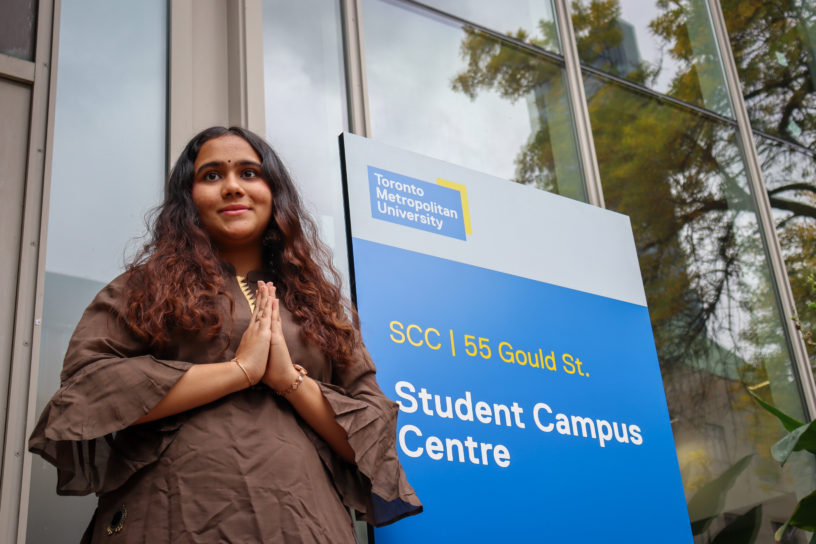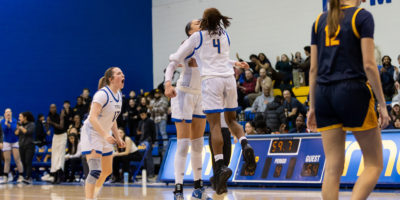By Khushy Vashisht
Some students at Toronto Metropolitan University (TMU) are banding together to form a new Hindu Students’ Association (HSA), a space for students to reconnect since the COVID-19 pandemic when the prior group closed down.
Hetu Patel, a third-year computer science student as well as the HSA’s president and founder, said she first thought of forming the group while working for the Toronto Metropolitan University Students’ Union (TMSU) as the vice president of education.
“I got the opportunity to learn more about all the student groups,” she said. “During the first week of March, I realized we didn’t have a Hindu [students’] association.”
Hetu decided to wait until the next academic year in order to take founding steps and try to register the association with TMSU.
According to Encyclopædia Britannica, Hinduism is considered one of the oldest religions in the world, with over a billion followers as of 2024. Its long and rich history fuelled part of Hetu’s desire to form the group as she wanted an open learning—as well as teaching—environment for Hinduism.
“[We’re] different nations but are the same communities, same feelings, everything is the same”
“The main motive of the HSA is to spread awareness about why those [religious] festivals take place,” said Hetu. “Hindu culture has so much depth to it and it explains everything around us.”
Ananya Nair, a first-year business management student, hopes the group can help tackle common and ignorant misconceptions surrounding the religion.
“People think that we actually worship like 300 million gods, that we worship cows and all that incorrect crap,” said Nair. “What annoys me is there’s very few people spreading awareness about what it actually is…I hope [the HSA] works to deter the stigma.”
Kruti Patel, a third-year law and business student, echoed Nair’s sentiment.
One instance of ignorance she shared was a 2017 post on X from the leader of the New Democratic Party of Canada, Jagmeet Singh, that said, “Raksha Bandhan has always bothered me because of the very overt sexist message it sends to women: they are powerless & need protection.”
“What annoys me is there’s very few people spreading awareness about what [Hinduism] actually is”
An article by the British Broadcasting Corporation describes Raksha Bandhan to be a “festival that celebrates the bond between brothers and sisters” stemming from a tale in Hindu mythology.
“There’s little things like that which people often overlook or think in a different way but I think it’s a lack of us actually sharing what our religion is about,” said Kruti. “I feel this kind of platform [the HSA] seems to be educating people, so it would definitely help tackle the misconceptions.”
Aside from educating the TMU community, another one of the HSA’s goals is to provide students of diverse backgrounds with access to a central campus community. Hetavi Shah, a first-year business technology management student and a marketing associate for the group, shares the same objective.
“There’s a lot of international students and a lot of people who don’t have access to the culture and everything firsthand in Canada right now,” said Shah. “It’s about bringing them together.”
“Yes, days are getting darker, but we can still see the light and see through it, and we’re gonna get through it together”
Divisha Shardha, a second-year fashion student, is an international student and a Pakistani Hindu.
According to the World Population Review, Hindus only make up about two per cent of the total population in Pakistan.
Although a part of a minority group in Pakistan, Shardha said different nationalities don’t matter in the broader community.
“Here, I got to meet so many people from the same community. They’re from India, but they are Hindu and they’re all Desi,” she said. “I feel there’s no big difference. [We’re] different nations but are the same communities, same feelings, everything is the same.”
Hetu said she would want to make the HSA “a comfortable environment” for Hindus from all over the world, regardless of their nationality. Hinduism is often associated with India as around 80 per cent of the country’s population follows the religion.
However, Hinduism expands beyond the borders of India.
“We have Pakistani, Indian, Sri Lankan, Bangladeshi and Caribbean Hindus,” she said. “I want to bring everyone together under one roof and make sure they all are comfortable sharing their beliefs and be curious to learn more.”
Shardha hopes to see initiatives within the HSA follow through on Hetu’s words.
“I hope they have gatherings for everyone regardless of coming from different nations or being international or domestic [students],” said Shardha. “It feels nice when you see people from the same society getting to know each other and exchanging different conversations.”
“Hindu culture has so much depth to it and it explains everything around us”
After they become officially registered with the TMSU as a student group, the HSA plans on hosting an event of some kind dedicated to Diwali—one of the largest Hindu festivals that takes place from Oct. 31 to Nov. 1 this year.
According to a PBS report, the festival is considered the Hindu New Year. Despite varying origin stories—that are dependent on which region one is from—the theme of good triumphing evil remains constant. During Diwali, many in Northern India celebrate the return of Lord Ram to his kingdom after a 14-year exile.
“We want Diwali in an authentic way where we understand why we celebrate [Lord Ram’s] homecoming,” said Hetu. “We want to spread the whole message of Diwali.”
Celebrated by over a billion people, the festival is a significant component of many Hindu homes. For many students, Diwali symbolizes a great deal of community—something they’d want reflected in the HSA’s initiative.
“It’s important to take a step back and celebrate all the joys in life,” said Kruti about Diwali. “Be like, yes days are getting darker, but we can still see the light and see through it, and we’re gonna get through it together.”












Leave a Reply